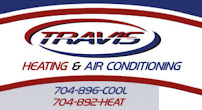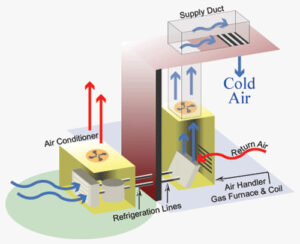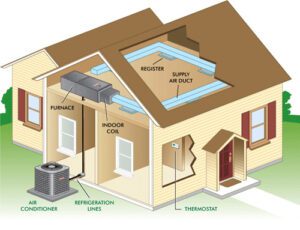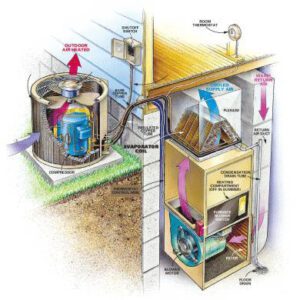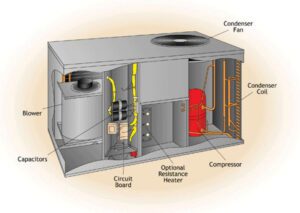Temperature, Cleanliness/Freshness of Air, Humidity, System Control
Some of the common comfort complaints from homeowners include: inconsistent temperatures from one room to the next, up and down temperature swings, constantly adjusting the thermostat, and more.
The system that is right for you will depend on several factors: your budget, your comfort expectations, physical factors such as what type of system currently exists in your home or office, the unique features of your location, and more. Below, you can explore the system options available and some of the key factors that affect your choice. Gas furnaces/air conditioners, heat pumps, boilers, or small packaged systems are the four typical options.
Key Accessories
Additional comfort comes from having clean, fresh air, as well as proper humidity levels inside. These products will fine-tune your system to help improve your overall comfort and the efficiency of your indoor comfort system.
- Air Cleaners
- Ventilators
- Humidifier
- System Control (different from a basic thermostat)
Key Factors That Affect Your Choice
Some of your home comfort decisions will be made for you based on some of the physical considerations involved, including:
Your home - some are big, some are small, some are old. Windows, trees, and all are factors. We have the expertise to assess any unusual circumstances surrounding the specific needs of your location.
Your existing system - If you are replacing an existing system, there are physical and financial reasons to stay with the same type of system. For example, if you currently have a boiler, it will be very expensive and physically challenging to install the ductwork you need for a forced-air furnace.
If you want a new type of system because you were dissatisfied with your comfort, remember that a new system will bring newer comfort technology and energy efficiency. Also, your comfort problem could be related to other issues, such as improper ductwork, system balance, cleanliness or freshness of the air, humidity control, and system control.
Your geographical region - Although there are exceptions to every rule, geography can play a role in what type of system will work best in your home.
Asking how much you'll spend on a new system is a lot like asking a builder, "How much is a house?" The builder will need to know if you want a 1,000-square-foot ranch on a quarter-acre lot, or if your needs run more towards a 3,500 square-foot, two-story model on two wooded acres. Then there are questions about whether you want brick or vinyl siding, and so on. In other words, the cost of a new heating and cooling system will depend on many factors.
Factors to Consider
- Will you be happy with the lowest-cost system that provides the basics of temperature control?
- Are you more interested in a complete, high-efficiency, programmable comfort system that provides air cleaning, humidity control, whole-house ventilation, and zoning?
- Is repairing an option instead of replacing the system?
Your final cost will depend on the options you choose. Additional factors that can affect cost are:
- The size and age of your home, availability of utilities, and the type of system you currently have.
Saving money on your energy bills will depend on four major factors:
Energy efficiency of your system, even the lowest efficiency systems currently allowed by the U.S. Government will almost always cost less to operate than a system that was installed 10 years ago.
Most manufacturers offer higher efficiency models, which will add to your savings on monthly utility bills.
Typically, higher efficiency systems will cost more initially, so it's important to look for the right balance between first cost and long-term savings.
Age and Condition of Your Home
For a variety of reasons, newer homes are more energy efficient than older ones. They are built to keep conditioned air inside, so you are not paying to heat and cool air that easily finds its way out of your home. As a home gets older, settling will cause some of that airtight construction to loosen up. Regardless of your home's age, you can do some simple maintenance to make sure that will help keep the conditioned air inside, where it belongs.
Be sure your home is adequately insulated. Adding insulation to attic areas is usually pretty easy.
Check the seals around windows, doors, electrical outlets, or any other potential sources for escaping air. Seal these areas using a good-quality caulk. Use weather stripping around moving parts of windows and doors.
System Maintenance
Before you perform any kind of maintenance, consider these important safety precautions.
- Disconnect all electrical power to the unit before removing access panels to perform maintenance. Please note that there may be more than one power connection switch.
- Although Carrier takes special care to prevent sharp edges in the construction of our equipment, it's best to be very careful when you handle parts or reach into units.
- Two simple things you can help maintain your system are to change the furnace or fan coil filter frequently and clean indoor and outdoor coils.
- Keep your outdoor condensing unit free of debris. If you keep grass clippings, leaves, shrubbery, and debris away from your outdoor unit, it should only require minimal care to operate properly. Check the base pan (under the unit) occasionally and remove debris, to help the unit drain correctly.
- If the outdoor coil becomes dirty, use a brush or a vacuum cleaner with a soft brush attachment to clean the surface. To clean dirt that is deep in the coil, contact your dealer.
- Take special care of outdoor condensing units in ocean environments. Since we live near the ocean, you can help preserve its optimal condition with a little extra care. Ocean mist and sea breezes carry salt, which is corrosive to most metals. Although many new units are made out of galvanized metal and are protected by top-grade paint, you can add life to your unit by washing all exposed surfaces and the coil approximately every three months.
- Make sure your outdoor unit stays in a level position. If the support for your split-system outdoor unit shifts or settles, and the unit is no longer level, re-level it promptly to make sure moisture drains properly out of the unit. If you notice that water or ice collects beneath the unit, arrange for it to be drained away from the equipment.
- Clean your humidifier at the beginning of every heating season. Review your owner's manual for the proper procedure to clean the external and internal components of your unit. The evaporator pad should also be replaced before each heating season. If the water in your area is hard or has high mineral content, you may need to clean or service your humidifier more frequently.
We offer a regular clean and check service that can help keep your system operating efficiently. This service helps detect potential problems before they become an emergency.
Evaluating a Dealer
Evaluating a dealer takes a little more brain work. This is an important process, however, because choosing the right dealer can make the difference between getting the most comfort and efficiency for your money or, getting stuck with a system that doesn't meet your needs. Here are some tips on evaluating a dealer:
Ask the dealers you are considering how long they've been in business. Common sense says that older, more established companies will have a better record or customer satisfaction.
Check to see the dealer's contractor's license. Dealers must have a license to receive the permits needed for the job. And, only licensed HVAC contractors can legally purchase the refrigerant needed for air conditioners and heat pumps.
Ask for references. Then, follow up by calling those people and asking them how satisfied they were with the dealer. Try to ask specific questions, about the dealer's timeliness, ability to follow through on start and finish times, etc.
Questions you may want to ask. This list was prepared by the Air Conditioning Contractors of America (ACCA).
- Will the contractor listen to your needs?
- Is the contractor complying with state and local codes?
- Has the contractor provided you with a list of professional, business, and trade references?
- Is the contractor in good standing with the Better Business Bureau?
- Has the contractor given you performance guarantees in writing?
- If anything goes wrong during installation, does the contractor have adequate insurance to cover your losses?
- Will the contractor stand behind your installation?
- Can the contractor service your new system in the future?
- Will the contractor install your new system in a timely, professional manner?
- Is the contractor financially responsible?
- Has the contractor provided you with a list of satisfied customers?
Making the Decision
If more than one dealer satisfies your requirements, trust your judgment. If you feel comfortable with one dealer, but still have reservations about another, go with the one you feel most comfortable with.
Think about how you take care of your car. Sure, most people can handle the little stuff - checking and topping off fluids, keeping tires inflated to the correct pressure, and changing the wiper blades. But, to keep your car operating at its best, you need an occasional tune-up from a trained professional.
Your heating and cooling system is no different. To get the most performance and longest life from your system, it's a good idea to have a professional perform routine checks in the early spring and the late fall.
Spring Maintenance
In the spring, your dealer will check a heat pump or air conditioner for all or some of the following:
- Operating Pressures
- Refrigerant Charge
- Filter Condition
- Compressor
- Fan Motor
- Capacitors
- Belts
- Crankcase Heaters
- Coils Cleaning
- Lubrication of Moving Parts
Fall Maintenance
In the fall, you can expect a dealer to check your furnace in the following areas:
- Burner and Pilot Assemblies
- Cracks in the Heat Exchanger
- Check the Pilot Thermocouple
- Examine the Filter and Check Vent Piping
- Test the Electronic Ignition
- Test the Fan
- Test the Limit Switch
- Burner Adjustments
- Measure Manifold Gas Pressure
- Measure Temperature Rise
- Carbon Monoxide Test
- Set the Heat Anticipator
- Check and Adjust Belt Tension
- Examine the Draft Diverter
- Lubricate the Fan Motor
The answer is, "Yes." Here are some simple procedures you can perform before going to the expense of a service call:
- Check disconnect switches (indoor and outdoor if you have a split system). Make sure that circuit breakers are ON, or that fuses have not blown.
- Check for sufficient airflow. Make sure air filters are clean and that supply-air and return-air grilles are open and unobstructed.
- Check the settings on your thermostat. If you want cooling, make sure the temperature control selector is set below room temperature and the SYSTEM switch is on the COOL or AUTO position. If you want heat, make sure the temperature control selector is set above room temperature and the SYSTEM switch is at HEAT or AUTO. The FAN switch should be set at ON for continuous blower operation or AUTO if you want the blower to function only while the unit is operating.
In addition to the routine maintenance you perform, your home comfort system should be inspected at least once a year by a properly trained service technician. We can make sure your system operates safely and gives you the best performance at the lowest cost. You may also want to ask us about an economical service contract that covers seasonal inspections for a flat fee.



